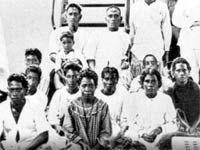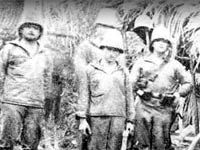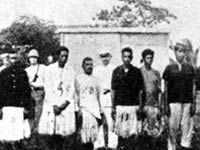The Sokehs Rebellion 15
- Description:
- With the German troops doggedly pursuing them around the island, Pohnpeian warriors began surrendering. Here several prisoners are being transported to Kolonia on a warship. It was now four months since the outbreak of the uprising. The Sokehs warriors had avenged themselves and no longer had the heart for battle.
- Collections:
- Micronesian Seminar Photo Album - The Sokehs Rebellion
- Content partner:
- Micronesian Seminar
- Availability:
- Not specified
-
Copyright status: All rights reservedFind out more about what you are able to do with this itemThis item is all rights reserved, with means you'll have to get permission from Micronesian Seminar before using it. For more information, please see our use and reuse page.What can I do with this item?Non-infringing useNZ copyright law does not prevent every use of a copyright work, and this item may be hosted by an international institute or organisation. You should consider what you can and cannot do with a copyright work.No sharingYou may not copy and/or share this item with others without further permission. This includes posting it on your blog, using it in a presentation, or any other public use.No modifyingYou are not allowed to adapt or remix this item into any other works.No commercial useYou may not use this item commercially.
User contributions
These words remain those of the contributors. If you wish to re-use them, please Contact us. For more information, view all User Contribution Terms.
Sokehs rebellion
By Emelihter | Pohnpei/Poneke | 4 Jul 2024
In 1910 Pohnpeians from Sokehs Island led a rebellion against the Germans. They killed the German district administrator and 3 other Germans. The leaders of the rebellion, 15 men, were massacred and the rest of the Sokehs people were exiled to Palau. This was big news at the time across Europe and the Pacific.
The information on this site has been gathered from our content partners.
The names, terms, and labels that we present on the site may contain images or voices of deceased persons and may also reflect the bias, norms, and perspective of the period of time in which they were created. We accept that these may not be appropriate today.
If you have any concerns or questions about an item, please contact us.



